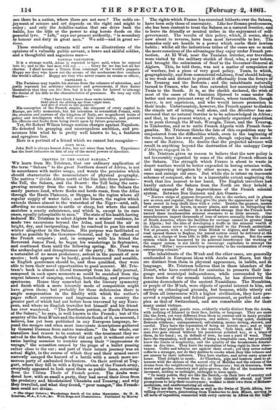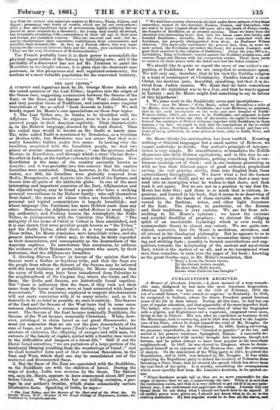TRAVELS IN THE GREAT SAHARA. * WE learn 'from Mr. Tristram,
that our ordinary application of the term " Sahara ". to the great Northern desert of Africa, is not in aecordanee with native usage, and wants the precision which should characterize the nomenclature of physical geography. The natives " divide Africa north of the line into three portions— the Tell, the Sahara, and the Desert : the Tell being the corn- growing eountry fro:m the coast to the Atlas ; the Sahara the sandy pasture land, where flocks and herds roam, from the Atlas through the Haute Plateaux, or Steppes, to the region where all regular supply of water fails ; and the Desert, the region which extends thence almost to the watershed of the Niger—arid, salt, affording no sustenance to eattle or sheep, but where the camel snatches a scanty subsistence, and which is, except in its rare oases, equally inhospitable to man." The state of his health having induced Mr. Tristram to select Algiers for a winter residence; he made two excursions beyond the Atlas, and found the air so bright, dry, and invigorating, that he resolved to pass his second winter altogether in the Sahara. His purpose was facilitated as much as possible by the Governor-General, and by the officers of the French outposts • and, in company with his friend the Reverend James Peed, he began his wanderings in September, and continued them until the following spring. Mr. Peed was the archaeologist and draughtsman of the party ; Mr. Tristram is a naturalist of no mean proficiency, ardent in the pursuit of new species ; both appear to be hardy, good-humoured and sensible, as English gentlemen should be, and thus qualified, they were able to turn their novel opportunities to good. account. Mr. Tris- tram's book is almost a literal transcript from his daily journal, composed in such spare moments as could be snatched from the urgent labours of camping, cooking, horsefeeding, and preserving specimens. Hence they somewhat lack the literary symmetry and finish which a more leisurely mode of composition might have given them; but probably for these deficiencies there is ample compensation in the fidelity with which the author's pages reflect occurrences and impressions in a country the greater part of which had not before been traversed by any Euro- pean, and where no English traveller but himself and his friend has ever wandered. " The Northern portion, or Haute Plateaux of the Sahara," he says, is well known to the French ; but of the country of the Beni M'zab and the districts South of it, no account, I believe, has yet been published in any European language, be- yond the meagre and often most inaccurate descriptions gathered by General Danmas from native travellers." On the whole, our travellers had reason to be content with the treatment they re- ceived in the Sahara, though they did not quit it without once or twice having occasion to number among their "impressions de voyage," the sensation caused by the range of a bullet passing rather close to the ear ; andpart of their return journey was an actual flight, in the course of which they and their armed escort narrowly escaped the hazard of a battle with a much more nu- merous party of ambushed freebooters. On their arrival at Tag- gart, where they fell in with a flying column of the French army, everybody appeared to look upon them as public lions, returning from the Ultima Thule of French power. The Arabs won- dered how, with so small a party, they had saved their lives from the predatory and bloodstained Chaamba and Touareg ; and why they travelled, and what they found, " pour manger," the French- men could not divine.
* The Griot Sahara ; Wanderings South of the Atlas Mountains. By H. B. Tristram, W.A., F.L.S., he. With Maps and Illustrations. Published by Murray
The rights which France has exercised hitherto over the Sahara, have been only those of suzerainty. Like her Roman predecessors, she has been content to treat the Sahara as a natural frontier, and to leave its friendly or neutral tribes in the enjoyment of self- government. The results of this policy, which, it seems, she is now about to reverse, have been most favourable to her. The
nomades only are hostile to a power which curbs their lawless
habits ; whilst all the industrious tribes of the oases are so much the more conscious of the advantages they enjoy under French pro- tection. At El Wed, near the Tunisian frontier, our travellers were visited by the military sheikh of Souf, who, a year before, had brought the submission of Souf to the Governor-General-at Algiers. This, he told them, was not a matter of compulsion dr of warfare, buts piece of very good policy. Tunis, to which, geographically, and from commercial relations, Souf should belong, ie too weak and distant to protect it effectually from the forays of
the Touareg and the Bedouin ; and the inhabitants naturally turned to France, who has thus extended her suzerainty behind
Tunis to the South. It is, as the sheikh declared, the wish of most of the oases of the Tunisian Djereed to come under the better and more puissant sway of France, whose taxation, though heavy, is not capricious, and who would insure protection to their trade. Unfortunately, however, the French appear to disdain the simple art of letting well alone, and the Moniteur has an- nounced that no natural frontier is to be acknowledged in Africa ; and that, in the present winter, a regularly organized expedition is to push through the M'zab, Waregla Touat, and the Touareg, to Timbuctoo, and so to unite French Algeria with French Sene- gambia. Mr. Tristram thinks the fate of this expedition may be conjectured from the difficulties which, even in the beginning of the route, beset his own small party, though enjoying the assist- ance of the Natives. He doubts that the projected advance will result in anything beyond the destruction of the unhappy Corps d'Afrique engaged in it.
Mr. Tristram gives us reason to believe that the new policy is net favourably regarded by some of the ablest French officers in the Sahara. The strength which France is about to waste in
desert warfare would be better expended in boring artesian wells, and improving irrigation by other means, so as to create new oases and enlarge old ones. But while she is intent on insensate
schemes of conquest, she is to a lamentable extent neglecting the work that lies nearest to her hand. The English travellers had
hardly entered the Sahara from the North ere they beheld a striking example of the improvidence of the French colonial system. Between Bon Gaizonn and Ain Oosera- " Narrow strips of gypsum frequently rise to the surface, and in places are so even and regular, that they give the plain the appearance of having
been scored in long chalk lines with a ruler. Besides the gypsum, masses
of natron appear in layers, in many places, and assist in variegating the weary brown of the surface. It is somewhat strange that the French have turned these inexhaustible mineral resources to so little account. Our manufacturers import thousands of tons of natron annually from the plains of South America, where the facilities for carriage cannot be greater thaa in Algeria ; but the idea of developing a traffic in the mineral wealth of the Atlas, seems never to have suggested itself to the French authorities: Yet at present, with a railway from Blidah to Algiers, and the military road opened thence to Boghur, the purest natron could be delivered at the coast, at a charge of from lbfr. to 2Ofr. per ton for carriage. But the same system which has hampered by its paternal interference the working of the copper mines, is not likely to encourage capitalists to attempt the Sahara. Heise ! noise sommes trop gouvernes,' is the exclamation of every enterprising colonist."
The inhabitants of the M'zab and the other oases, are generally confounded in European ideas with Arabs and Moors, but they
are distinct from them in physical appearance, in habits, and in
language. Mr. Tristram believes that in these islanders of the Desert, who have contrived for centuries to preserve their lan- guage and municipal independence, while surrounded by the fierce hordes of the nomadq intruders, he has discovered the genuine descendants of the ancient Numidians. The Mozabites, or people of the M'zab, were objects of special interest to him, not
merely on ethnological grounds, but because, while utterly cut off from all intercourse with a higher civilization, they have pre- served a republican and federal government, as perfect and com- plex as that of Switzerland, and are remarkable also for their many social virtues. " They are a mild, gentle race, evidently wholly distinct from the Arabs, with nothing of Ishmael in their face, habits, or language. They are mese
like the Jews, yet very different from them in contour and in many peculiak' • traits—living on fruits, fruit-buyers, and sellers; loving quiet, disliking Bedouin wildness; unimpassioned, Calculating, money-loving, shrewd, and careful. They have the reputation of being an honest race ; and so they are ; yet they prudently keep to the maxim, Safe bind, safe find.' No man ever goes abroad without his ponderous polished key, or a brace of them, in his hand ; or, in default of iron, he uses a yard of wood. They have the reputation, well merited, of being a hospitable race, but prudently know the limits of hospitality, and the quality of the kouskousou deterio- rates in due time. They have the reputation of being rigid in their obser- vances. Coffee and tobacco are against their creed ; yet they never refuse coffee to a stranger, nor do they decline to smoke when they like tobacco and are unseen by their inferiors. They hate warfare, and never carry arms at home. They delight in music. At Ghardaia, pipe and tomtom used to al- ternate with the sicken) of the sacred city of Mellika and the echoes of the drums from the neighbouring heights of Bounoura • but at Guerrara, from tower and garden, cemetery and palm-groves, the din of the tomtorns was incessant, midday to midnight, midnight to noon again. "In many points, they are like the Scotch,—in their love of country and their readiness to wander from it; in their clanship abroad, and their promptness to help their countrymen ; wedded to their own form of Moham- medanism, and anathematizing all others.
" They are the very Venetians as well as the Swiss of North Africa, tra- veiling everywhere, penetrating from Timbuctoo to Asia Minor, serving in all sorts of capacities, connected with every caravan in Africa on the high- way from its central and ,unknown regions to Morocco, Tunis, Algiers, and Egypt ; possessing vast herds of camels, which are let out everywhere ; with a free and republican form of government, highly artificial, but co- loured in some respects by a theocracy ; the young men nearly all abroad, but invariably returning with a eompetency in their old age to their poor and barren, yet cherished country. They are reserved and cold ; but in- tegrity characterizes their commerce, truthfulness their conversation, and morality their domestic life. In fact, as a French officer, who was expa- tiating on the contrast between them and the Arabs, once exclaimed to me,
They are the very Protestants of Mohammedanism.' "
The French probably have it in their power to accomplish the physical regeneration of the Sahara by fertilizinc,b arts ; and if the partiality of a discoverer has not led Mr. Tristram to paint the Mozabites in too bright colours, it is plain that the dominant race possesses, in this prosperous and well regulated community, the nucleus of a most valuable population for the renovated territory.



























 Previous page
Previous page